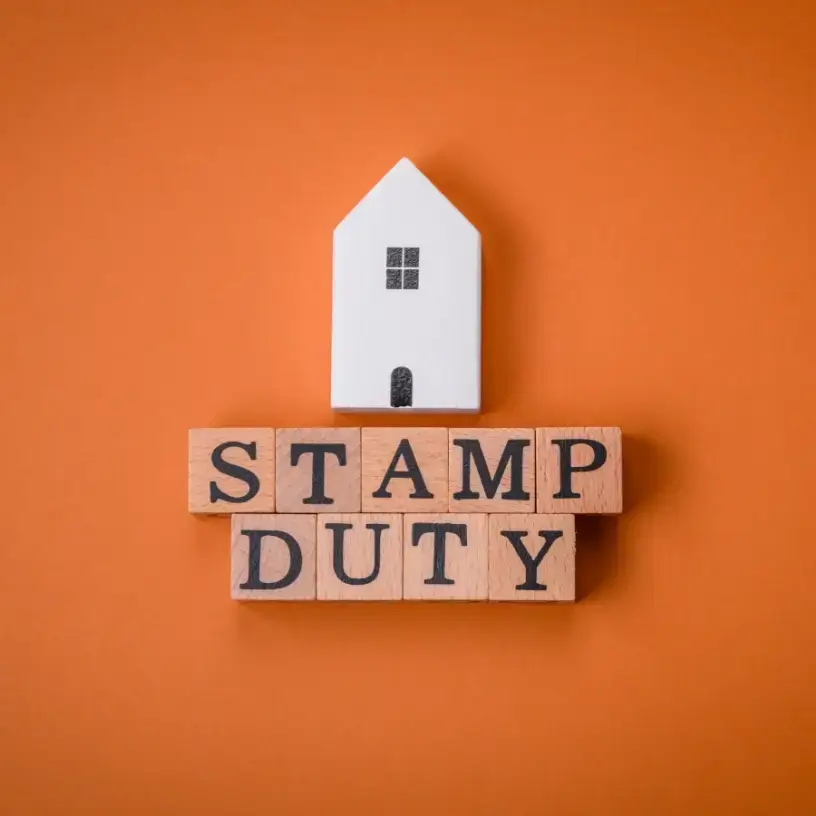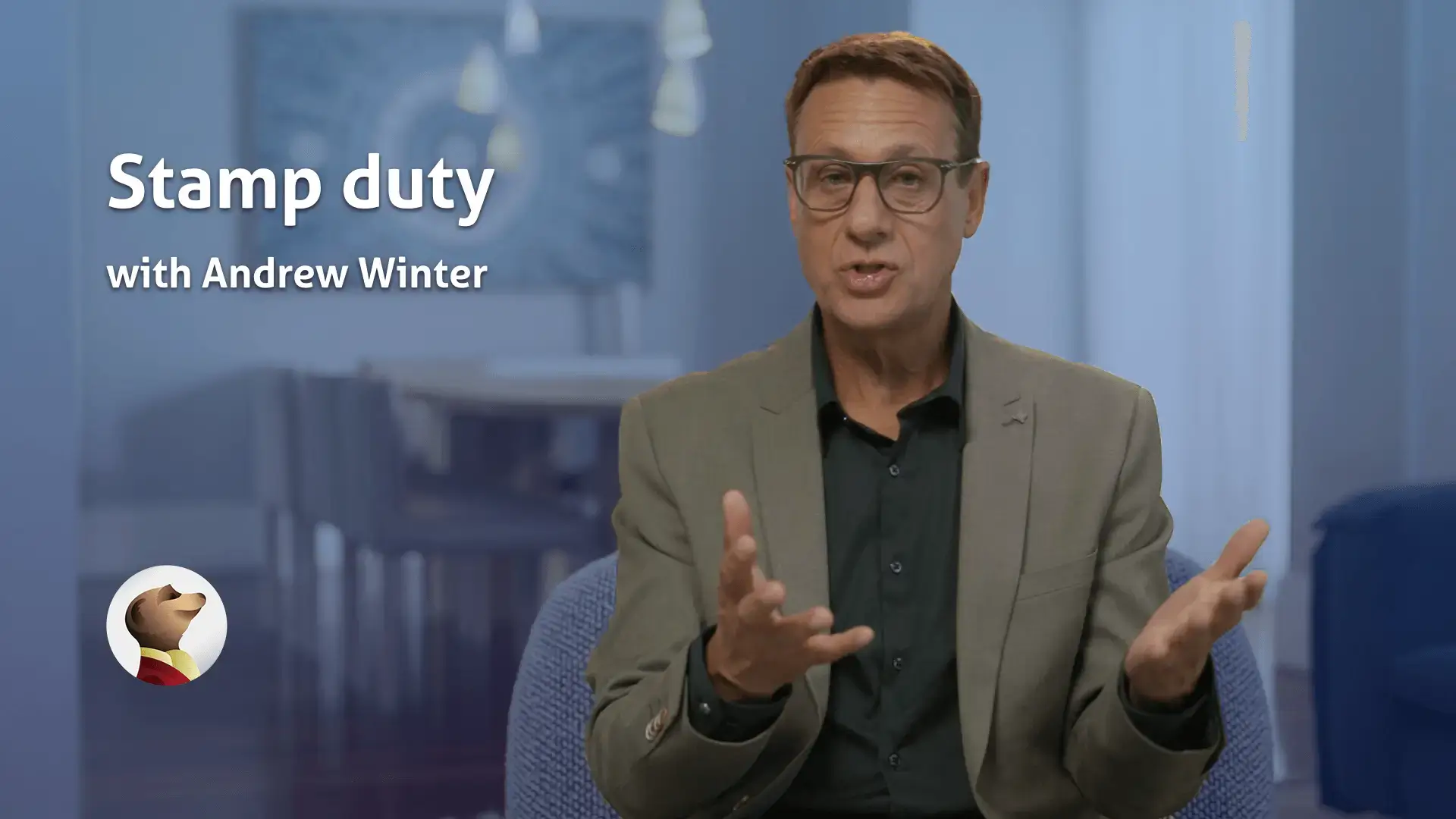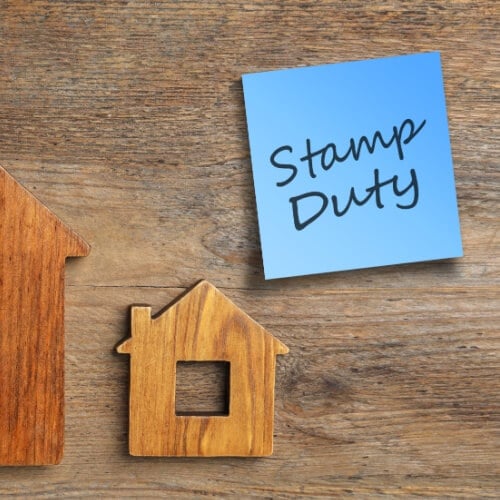Home / Home Loans / Stamp duty calculator VI…




Key takeaways
- Stamp duty, also known as a transfer fee, is a government fee that homebuyers in Victoria, as well as around the country, will usually have to pay when they make a property purchase.
- The amount of stamp duty you pay will be determined by a range of factors including your individual circumstances and the property price.
- If you’re buying your first home in Victoria, you may be eligible for a stamp duty concession or exemption.
- In Victoria, homebuyers are required to pay their stamp duty either at settlement or within 30 days of settlement.
Stamp duty and how it works
Don’t quite understand stamp duty? You might want to watch this explainer from Selling Houses Australia host, Andrew Winter.



Hi, I’m Andrew Winter, host of Selling Houses Australia.
As someone who’s no stranger to the homebuying process, I’m well aware of what kinds of costs
I’ll have to deal with if I buy a property. But there are plenty of homebuying costs that
can catch first home buyers unawares, and the largest of these will typically be your transfer
duty – or ‘stamp duty’ as it’s often called. Stamp duty is a government tax that’s charged
whenever legal ownership of a property is transferred between two parties as part of a sale.
It’ll often cost the buyer – that’s you! – thousands, or even tens of thousands of dollars,
so it’s definitely a cost worth keeping in mind, and budgeting generously for.
Now, each state and territory charges different amounts of stamp duty on
different property value thresholds. So, you’ll need to make sure you’ve
looked at the specific rates and thresholds for where you live, to get an accurate idea
of what your stamp duty bill could look like. When it comes time to pay your stamp duty
which will usually be at settlement – you’ll typically be paying it completely out of pocket. Ouch.
The only exceptions I’d point out would be first home buyers, who are often eligible
for some sort of stamp duty discount or exemption. But even those aren’t guaranteed – you’ll need to
check what’s on offer in your state or territory, as well as with your conveyancer in order to
figure out the applicable government fees. Luckily, Compare the Market can help you
both understand how stamp duty is charged where you live, and then calculate your
payable stamp duty once you’re ready to buy. Their home loan comparison tool lets you specify
the property you’d like to buy, along with what you’re planning on using it for and your
particular buying circumstances, and then tells you how much stamp duty you’d pay on the purchase.
So, whether you’re a first home buyer or a seasoned property expert, Compare the Market
can help you with your next property journey – they make it as easy as comparing home loans.
Our VIC stamp duty calculator
Expert tips for stamp duty in Victoria
As our General Manager of Money, Stephen Zeller understands that homebuyers might have a lot of questions about stamp duty and how it works – with that in mind, here are his three top tips regarding stamp duty in Victoria.

Calculate your stamp duty correctly
Different parts of Australia charge different amounts and rates of duty. This means that when you’re calculating your estimated stamp duty payable, it’s important to make sure you’ve selected the right state or territory. Otherwise, you could end up being way off base with your estimations.
Know how much you’ll pay
It can be easy to overlook or underestimate your stamp duty costs when totalling your homebuying expenses, so make sure you’ve done your research and understand how much stamp duty you’ll likely have to pay on a given property purchase. Make sure to do your research, as any savings you can make on government fees could have a meaningful impact on your overall property purchasing costs.
Our expert brokers are here to help
If you’re unsure about what possible stamp duty exemptions or concessions you might be eligible for, feel free to contact our team of expert mortgage brokers. They’ll be able to tell you what options may be available to you based on your own individual circumstances, as well as help you figure out how much stamp duty you might have to pay.
How much is stamp duty in Victoria?
How to calculate stamp duty in Victoria
The amount of stamp duty payable will vary based on the dutiable value of the property being purchased. It’s calculated by applying a sliding scale of taxation based on either the property’s purchase price or its market value, whichever is greater.1
Victoria has two sets of stamp duty rates: one set of concessional rates for principal places of residence and one set of general rates for non-principal places of residence/investment properties.
The thresholds for stamp duty on principal places of residence in Victoria are set by the Victorian State Revenue Office, and currently apply to contracts that were entered into on or after 6 May 2008. The current stamp duty rates for principal places of residence in VIC (as of March 2025) are listed in the table below.2
| Dutiable value range | Rate |
|---|---|
| $0 – $25,000 | 1.4% of the dutiable value of the property |
| > $25,000 – $130,000 | $350 plus 2.4% of the dutiable value in excess of $25,000 |
| > $130,000 – $440,000 | $2,870 plus 5% of the dutiable value in excess of $130,000 |
| > $440,000 – $550,000 | $18,370 plus 6% of the dutiable value in excess of $440,000 |
| More than $550,000 | The principal place of residence concessional rate does not apply. You’ll be charged at the relevant general land transfer duty rates. Please refer to the next table for the general land transfer duty rates. |
The general rates of stamp duty as of March 2025, which apply to properties not being used as a principal place of residence, apply to contracts entered into on or after 1 July 2021 and are listed in the table below.2
| Dutiable value range | Rate |
|---|---|
| $0 – $25,000 | 1.4% of the dutiable value of the property |
| > $25,000 – $130,000 | $350 plus 2.4% of the dutiable value in excess of $25,000 |
| > $130,000 – $960,000 | $2,870 plus 6% of the dutiable value in excess of $130,000 |
| > $960,000 – $2,000,000 | 5.5% of the dutiable value |
| More than $2,000,000 | $110,000 plus 6.5% of the dutiable value in excess of $2,000,000 |
It’s worth noting that you may be eligible for certain exemptions and concessions which can affect the price you pay. You should do your own independent research on any exemption or concession you think you might be eligible for.
What property types does stamp duty apply to in Victoria?
In Victoria, stamp duty is payable for various types of property. You typically pay stamp duty if you purchase, acquire or otherwise become an owner of property in any way, such as through a lease, trust or gift. For example, stamp duty is payable on:3
- Residential properties (including first homes over a certain value)
- Investment properties
- Holiday homes and secondary residences
- Commercial properties
- Primary production land.
However, as mentioned, VIC offers a number of different stamp duty concessions and exemptions. You may be eligible for one depending on your buying circumstances, the intended purpose of the property you’re buying (i.e. whether you’re an owner-occupier or an investor) and the value of the property in question.
Do foreign purchasers pay stamp duty?
Foreign buyers (whether they’re a resident, company or trust) purchasing residential land in Victoria must pay the regular stamp duty that’s applicable, plus an 8% foreign purchaser additional duty.4
Victoria’s stamp duty concessions and exemptions
Do first home buyers pay stamp duty in Victoria?
You may be eligible for a stamp duty exemption or concession in Victoria as a first home buyer. As of July 2017, the Victorian Government has scrapped stamp duty for eligible first home buyers on new and existing homes valued at $600,000 or less,5 and offers a concession for properties worth $600,000-$750,000.
Similar to how stamp duty is normally calculated, the first home buyer duty concession is applied on a sliding scale. The closer the value of your property is to $600,000, the bigger a stamp duty concession you receive. This stamp duty concession applies to new homes, established homes and vacant land.
The table below demonstrates how much you’d save on stamp duty with the first home buyer duty concession, with a principal place of residence concession, at a range of different dutiable values.5
| Dutiable value ($) | Normal duty ($) | Duty after concession ($) |
|---|---|---|
| 605,000 | 31,370 | 1,045 |
| 625,000 | 32,570 | 5,428 |
| 650,000 | 34,070 | 11,356 |
| 675,000 | 35,570 | 17,785 |
| 700,000 | 37,070 | 24,713 |
| 725,000 | 38,570 | 32,141 |
| 745,000 | 39,770 | 38,444 |
The stamp duty exemption and concessions for first home buyers are also available for vacant land, but it must be bought with the purpose of building a principal place of residence on it.
Note that any stamp duty exemption or concession you receive is separate to Victoria’s First Home Owner Grant (FHOG). You may be able to receive both a first home buyer grant and a stamp duty concession or exemption depending on your individual circumstances.
Are pensioners exempt from paying stamp duty in Victoria?
You could get a stamp duty exemption if you’re an eligible pensioner buying a property in Victoria to use as your primary residence. You’ll need to hold a valid Commonwealth concession card and, in most circumstances, need to be the primary card holder.6
Cards that are eligible include:
- Services Australia Health Care Card, except the Foster Child Health Care Card (FO or FST) and Carer Allowance Health Care Card (CD)
- Services Australia Pensioner Concession Card
- DVA Pensioner Concession Card
- Services Australia Commonwealth Seniors Health Card
- DVA Commonwealth Seniors Health Card
Are there any other concessions or exemptions for stamp duty in Victoria?
In addition to the stamp duty concessions and exemptions available for first home buyers and pensioners in Victoria, you may be eligible for other discounts or stamp duty waivers.3 Exemptions may be available if:
- Land is transferred into your name from a deceased estate
- A family farm is transferred between family members (subject to the nature of the transfer, the class of the land and parties involved)
- Land is transferred between partners or spouses
- You’re a young farmer purchasing your first farm
- Corporate groups reorganise business structures or become a single entity for tax purposes
- You’re carrying out a transfer of land as a charity or friendly society.
Concessions or exemptions may also be available to those purchasing property in regional Victoria for commercial, industrial or extractive industry purposes and those who hold a valid Commonwealth concession card.
Paying your stamp duty in Victoria
When is stamp duty payable in Victoria?

Stamp duty is payable in Victoria within 30 days of settlement, and failure to pay within this timeframe may see you incur penalty tax and interest. Interest is charged at the market rate (which is adjusted every July) plus a premium of 8% per year on any unpaid stamp duty.
The interest rate as of March 2025 until 30 June 2025 is 12.36%, which is the premium rate of 8% plus the current market rate of 4.36%.7 As an example, this means you’d incur an additional $1,236 in tax for every year you didn’t pay a $10,000 stamp duty bill and, depending on the circumstances, penalty tax rates could also apply.
However, it’s worth noting that if you’re buying a home with the assistance of a lender via a home loan, you’re generally required to have your stamp duty sorted and paid at settlement as part of your upfront costs.
Where do I pay stamp duty in Victoria?
In Victoria, your bank, solicitor or conveyancer will generally arrange to pay the stamp duty on your house, land or property on your behalf. However, always check with them or request a duty statement, as you may incur fees if they don’t pay your stamp duty in time.
Meet our home loans expert, Stephen Zeller
Stephen has more than 30 years of experience in the financial services industry and holds a Certificate IV in Finance and Mortgage Broking. He’s also a member of both the Australian and New Zealand Institute of Insurance and Finance (ANZIIF) and the Mortgage and Finance Association of Australia (MFAA).
Stephen leads our team of Mortgage Brokers, and reviews and contributes to Compare the Market’s banking-related content to ensure it’s as helpful and empowering as possible for our readers.
1 State Revenue Office Victoria. Dutiable value of a property. 2025.
2 State Revenue Office Victoria. Principal place of residence duty rates. 2025.
3 State Revenue Office Victoria. Land Transfer Duty. 2025.
4 State Revenue Office Victoria. Foreign purchasers of property. 2025.
5 State Revenue Office Victoria. First home buyer duty exemption, concession or reduction. 2025.
6 State Revenue Office Victoria. Approved Commonwealth concession cards. 2025.
7 State Revenue Office Victoria. Interest rates. 2025.

